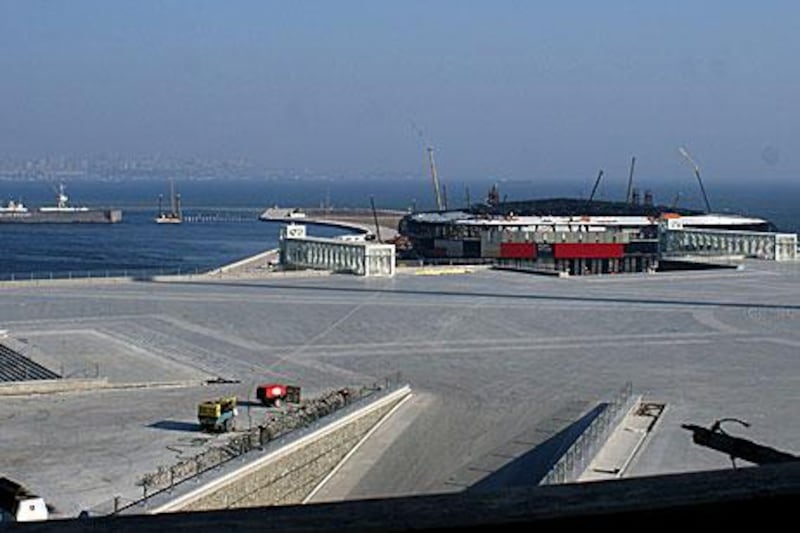BAKU // In the shadow of an enormous Azerbaijani flag, a landmark concert hall is rising from the Caspian Sea shoreline as the country prepares to host the Eurovision Song Contest in May.
But a human rights dispute has marred Azerbaijan's preparations for the musical extravaganza as homes are demolished as part of an urban regeneration project which includes the modern Crystal Hall where Eurovision will be staged.
Minara Iskenderova, a pensioner, lives with her daughter and son in the last apartment block to remain standing near the construction site in Baku's National Flag Square.
Many of her neighbours have already moved out, leaving the block with its impressive sea views looking half-abandoned and on the verge of dereliction, with many doors and windows ripped out.
"I'm taking what is happening very painfully. Since this process started, my blood pressure has risen and I've started to get ill," Ms Iskenderova said. "I cannot get used to the thought that we will have to move away from here."
Natalia Alibekova, another pensioner still holding out against eviction from the condemned block, said she expected to be thrown out any day now when the demolition crew moves in.
"I will have memories of my home whenever Eurovision takes place," she said.
Rights activists allege that several hundred families have been evicted from the area so far under pressure from the Baku city authorities to accept what they claim is inadequate compensation that will not buy similar apartments in the centre of the capital.
"The pressure comes from various sides," said Zohrab Ismailov, of the Public Association for Assistance to Free Economy campaign group, claiming that the authorities sometimes cut off gas, electricity and water to intimidate people into leaving.
The Baku mayor's office said it could not comment on the issue, but officials have said that the compensation offered is fair.
Baku erupted into an all-night street party after singers Ell and Nikki won Eurovision in Düsseldorf in May 2011, giving Azerbaijan the right to host the contest this year.
Often cringeworthy but always watchable, Eurovision is a cherished institution, with 43 nations competing, then whittled down to 20 for the grand televised final.
The administration led by President Ilham Aliyev sees Eurovision 2012 as a chance to boost the international profile of a country until now mainly known as an energy exporter on the fringe of Europe that went through war and political turmoil after the Soviet collapse.
"This event will positively affect Azerbaijan's overall image," Abulfas Garayev, the culture and tourism minister, told media.
The authorities have rejected allegations of property rights abuses and official intimidation, saying that the redevelopment of National Flag Square is not connected to Eurovision but part of a citywide urban renewal scheme.
Flush with oil money, Baku has undergone a construction boom in recent years, with hundreds of new buildings transforming the skyline of the capital, while the once shabby downtown area has been turned into a upmarket shopping haven.
Campaigners estimate that thousands may have lost homes during the gentrification drive which also led to the controversial demolition last year of the offices of rights advocates who were campaigning on behalf of those evicted.
Campaigners hope that while Eurovision increases interest in Azerbaijan, it will also focus attention on alleged violations of democratic rights and freedom of expression.






